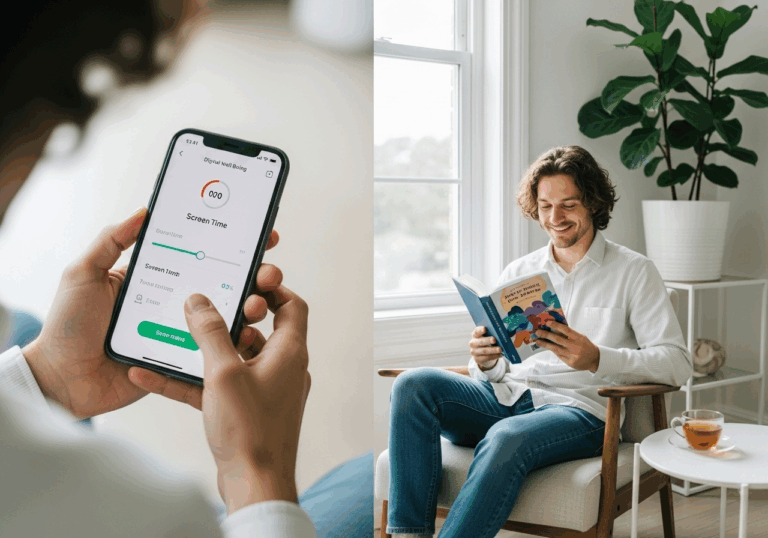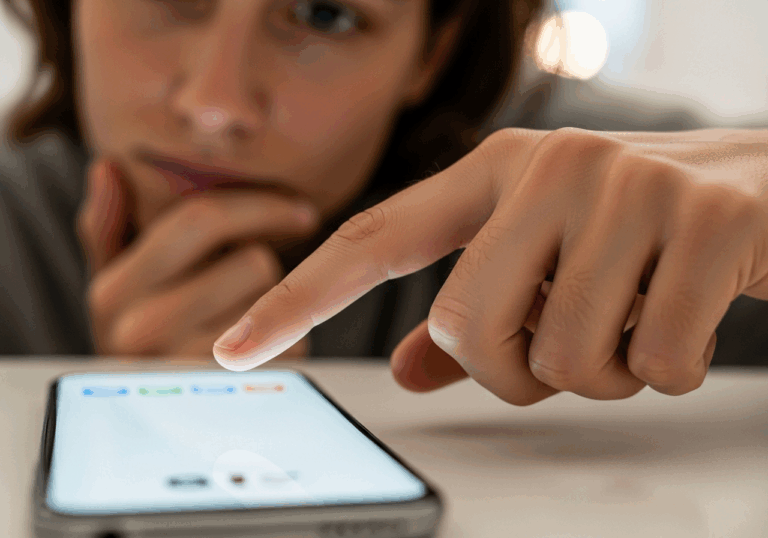Science-Backed Tips
Reduce Screen Time for Better Mental Health
Cutting screen time by 50% can lower anxiety levels significantly.
📊 Did you know?
💡 Why It Matters
1️⃣
Reducing screen time can lead to a 30% decrease in anxiety symptoms, improving overall mental health.
2️⃣
Lower anxiety levels can enhance academic performance, with studies showing a 20% increase in grades among students who limit screen use.
3️⃣
Digital moderation fosters better emotional connections, reducing feelings of disconnection by 40%.
✅ Try These Micro-Tips
🎯
Limit recreational screen time to 1 hour per day.
🎯
Engage in physical activities for at least 30 minutes daily instead of screen use.
🎯
Incorporate 15-minute mindfulness breaks during screen use to enhance emotional regulation.
🎯
Encourage family screen-free dinners at least 3 times a week.
📚 The study
A recent study by Greater Boston Behavioral Health (2024) underscores the importance of digital moderation, highlighting that reducing screen time can lead to a remarkable 30% decrease in anxiety symptoms.
This improvement in mental health not only enhances overall mood but also translates into tangible benefits in academic performance, with students who limit their screen use experiencing a 20% increase in grades.
Furthermore, embracing digital moderation fosters deeper emotional connections, reducing feelings of disconnection by an impressive 40%.
As we navigate a world increasingly dominated by screens, understanding the impacts of our digital habits is crucial.
By prioritizing our mental wellbeing and making conscious choices about our screen time, we can cultivate a healthier, more balanced lifestyle.
This study serves as a powerful reminder that taking steps to limit our screen exposure can significantly enhance our emotional stability and overall mental health.
Let’s take charge of our digital lives and reap the benefits of a more mindful approach to technology use.
❓ Frequently Asked Questions ❓
Learn more
How does limiting screen time affect mental health?
Limiting screen time has been linked to reduced anxiety and depression symptoms. This reduction can enhance overall mood and psychological balance.
What is the recommended daily limit for recreational screen time?
It is recommended to limit recreational screen time to 1 hour per day. This helps in reducing feelings of disconnection and improving emotional well-being.
How does excessive screen use impact academic performance?
Excessive screen use can lead to increased anxiety levels, which negatively affects academic performance. Studies show that students who limit screen time can see a 20% increase in their grades.
What are some benefits of reducing screen time?
Reducing screen time can lead to a 30% decrease in anxiety symptoms and a 40% reduction in feelings of disconnection. These benefits contribute to improved mood and emotional stability.
How can physical activities help with screen time reduction?
Engaging in physical activities for at least 30 minutes daily can serve as a healthy alternative to screen use. This not only reduces screen time but also promotes better mental health.
What role do mindfulness breaks play during screen use?
Incorporating 15-minute mindfulness breaks during screen use can enhance emotional regulation. These breaks help mitigate the negative effects of prolonged screen exposure.
Why is it important to have screen-free family dinners?
Encouraging family screen-free dinners at least three times a week fosters better emotional connections among family members. This practice can significantly reduce feelings of disconnection.
What is the link between digital moderation and emotional stability?
Digital moderation supports emotional stability by reducing anxiety and depression symptoms. This leads to an overall improvement in mental health and well-being.
How does screen time affect feelings of disconnection?
Excessive screen time is associated with increased feelings of emotional disconnection. Reducing screen time can help alleviate these feelings by fostering better interpersonal connections.
What are the psychological benefits of reducing screen time?
Reducing screen time can enhance mood and improve psychological balance. This leads to a healthier mental state and better emotional well-being.





